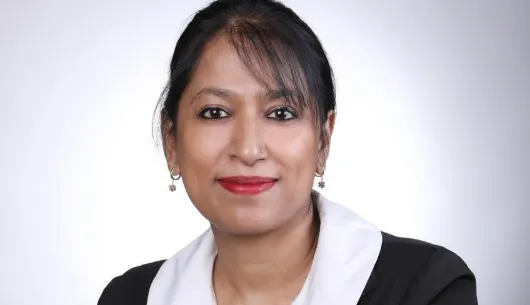
Adila Chowan.
Image: Supplied
WHISTLE-BLOWER Adila Chowan, who was the group financial executive manager of Associated Motor Holdings, a subsidiary of Imperial Holdings Limited, had filed a discrimination case in the North Gauteng High Court.
She had taken Associated Motor Holdings, as well as Imperial Holdings Limited and its chief executive officer Mark Lamberti to court and won her case in 2018.
Chowan said despite being a chartered accountant with motor industry experience, she was overlooked on two occasions to the appointment of the chief financial officer.
“When I raised my concerns, Lamberti addressed me as a ‘black female employment equity’ and that if I was not happy I should consider options external to the organisation. He failed to recognise that I am a qualified chartered accountant and held numerous executive positions.
“He then went on to appoint a white male who did not have motor industry experience. Lamberti asked me to ensure that I train the male into the chief financial officer position which I had acted in.
“I wrote a grievance to the board chairman of Imperial. Instead of independently investigating my complaint about racism, the board allowed Lamberti to appoint a legal firm to investigate my complaint. Subsequently, the same law firm drafted trumped up charges of misconduct relating to my complaint and dismissed me,” she said.
Chowan said the high court found that she was a whistle-blower.
“They also found that Lamberti played judge, jury and executioner in investigating my complaint and trumped up charges related directly to my whistleblowing and unlawfully dismissed me."
Chowan despite the challenges, she remained motivated.
“During this period, was unemployed and started litigating when I was diagnosed with cancer. I believe the stress was the trigger of the illness. However, I was fortunate to have my husband, parents and sisters who were my strength and support. I am now in remission.
“While the case was in court for two years, I started studying LLB. In 2020 I did my pupillage and passed the bar exams. Today I hold two qualifications, as a chartered accountant and an advocate. However, I believe that despite my qualifications I am seen as ‘tainted’. But I do not believe in being a victim. My profound faith in God has made me successful,” she said.
Chowan said she hoped her success story could be replicated with other whistle-blowers.
“However, this is not always the case and some whistleblowers have paid the ultimate price with their lives.”
She said while the Protected Disclosures Act (PDA), offered some safeguards for whistleblowers, its effectiveness was limited.
“Furthermore, the PDA’s provisions are often inconsistent with other legislation, creating a complex and confusing legal landscape for whistle-blowers. To address the shortcomings the Department of Justice released proposed reforms in 2023.
“These include expanding the scope of the PDA to cover individuals beyond the employer-employee relationship, establishing a fund to support whistle-blowers facing financial hardship, and incorporating whistle-blower protection into the Witness Protection Act. While these proposals are a step forward, they may not go far enough to address the full range of challenges whistle-blowers face,” she said.
Chowan said while the government, law enforcement agencies, and National Prosecuting Authority (NPA), have made some efforts to address the killings of whistle-blowers, significant challenges persist in ensuring accountability and justice.
“While there have been some high-profile arrests and convictions related to the killings of whistle-blowers, systemic issues such as corruption, political interference, and inadequate witness protection continue to hinder justice.
“Addressing these challenges requires comprehensive reforms to strengthen the independence and capacity of law enforcement and prosecutorial bodies, as well as robust mechanisms to protect whistleblowers from retaliation,” she said.
Chowan added if swift and effective protection for whistle-blowers is not implemented several serious and far-reaching consequences were likely to follow.
“There could be increased corruption and impunity. Without whistle-blowers, corruption thrives unchecked. If people fear for their lives or livelihoods when speaking out, fewer will come forward. This allows corrupt networks especially within state institutions and public procurement to deepen and operate with impunity.
“There is the possibility of a decline in public trust. Whistle-blower murders like that of Babita Deokaran and lack of justice reinforce a perception that the state cannot or will not protect whistle-blowers. The resultant effect is citizens become increasingly cynical about institutions like SAPS, the NPA, and Parliament. In addition, voter apathy increases, weakening democratic accountability. Community unrest or vigilantism could also rise as people take justice into their own hands,” she said.
Chowan, who is a member of the Active Citizens Movement, added that the lack of a strong deterrent or effective prosecution for whistle-blower killings also made future assassinations more likely.
Related Topics: